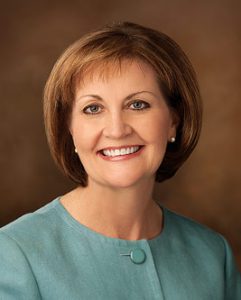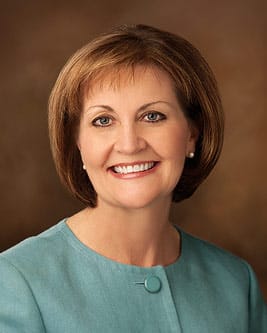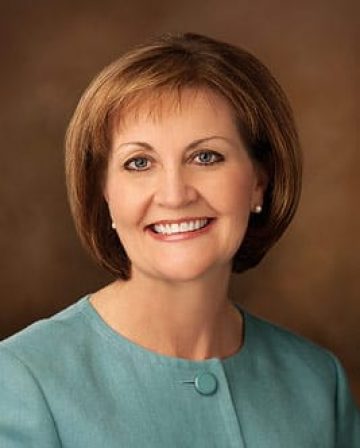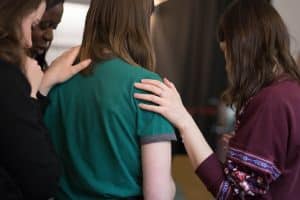
I loved Sister Burton’s talk at the General Women’s Session. Her talk was framed around the concept of “certain women,” based off of scriptures in Luke that refer to “certain women” who walked with Christ as his followers and disciples. She said,
The New Testament includes accounts of certain women, named and unnamed, who exercised faith in Jesus Christ and in his Atonement, learned and lived his teachings, and testified of his ministry, miracles, and majesty. These women became exemplary disciples and important witnesses in the work of salvation.
She specifically referenced Luke 8:1-3, which talks of “certain women” who walked with Christ and his disciples, “preaching and shewing the glad tidings of the kingdom.” She also referenced Luke 24:22-23, which says that “certain women” were early at the sepulchre, and had witnessed Christ’s resurrection. Despite having read these passages countless times, the phrase “certain women” jumped off the page and led her to ponder what it could mean to be a “certain” woman.
She goes on to mention synonyms of “certain” as it relates to faithful discipleship: convinced, positive, confident, firm, definite, assured, and dependable. I love how Sister Burton re-frames “certain women” to be more about the individual qualities within the women, rather than a group of women separate from others. Rather than this being about a certain group of women, she centers her talk on women who are certain.
She goes on to use examples of women in the scriptures and in the early church who showed their certainty:
- the woman at the well who has a theological discussion with Christ before going on to proclaim to others, “Come, see a man, which told me all things that ever I did: is this not the Christ?“
- Martha, sister of Lazarus, who after the death of her brother, declared to Christ with assured faith that “if thou hadst been here, my brother had not died,” but also that “whatsoever thou wilt ask of God, God will give it thee” and “I believe that thou art the Christ, the Son of God, which should come into the world.”
- Drusilla Hendricks, who cared for her disabled husband and family despite persecution, and who wrestled with the Lord when her son was called up for service with the Mormon Battalion. She was asked in prayer, “Do you want the highest glory?” She responded “Yes,” and the voice continued, “How do you think to gain it save by making the greatest sacrifices?” (this story is one of many referenced in At the Pulpit: 185 Years of Discourses by Latter-day Saint Women, which is an incredible resource!)
Another thing that I loved about Sister Burton’s talk were the varied examples of women she held up – she referenced women she had come to know in Hong Kong, Taiwan, Malaysia, Indonesia, India, and other places as being “certain women.” Before she began her address, she spoke of visiting women in prison and said that she hoped those women would know that she has not forgotten them with her talk, implying (in my mind, at least) that those women are also “certain.” She talked about a woman in her life who is confined to a wheelchair, but maintains an attitude of faith and fervent testimony despite many difficulties with a degenerative illness. She referenced Jenny Reeder, LDS Church Historian and co-author of “At the Pulpit,” as a “certain woman,” who despite being diagnosed with leukemia while working on her doctorate degree, exemplified courage and strength. I love that she mentioned women who have made mistakes, disabled women, non-American women, and women getting advanced degrees as examples of “certain women.” Simply put, there is not only one way to be a “certain” woman and disciple of Christ.
She also included a bit about how “gospel living often clashes with family and country cultures,” which made me grimace. I agree that many countries – including the United States – have cultures and systems in place that contradict the teachings of Jesus, but so often “gospel culture” has been equated with “conservative, capitalist American culture” and I hope that was not the message she intended. I very much love Sister Okazaki’s take on this in her 1996 General Conference address entitled “Baskets & Bottles.”
Overall, Sister Burton’s talk lifted me up and gave me great hope. I love her exhortation of women as disciples of Christ, as witnesses, and as spiritual authorities and role models. It is a little disheartening to hear the stories of these incredible women of scripture and faith while recognizing that current church policy doesn’t allow for women to act as official witnesses, but I was left overall with a feeling that the church is good, and that the restoration of Christ’s church is both ongoing and incomplete. May we all strive to be women who are certain in testifying of the things we know to be true!






11 Responses
Great summary, Liz. Sounds like it was overall a nice talk. Thanks!
Love it, Liz! I really liked that Martha got a lot more credit than she normally does in an LDS context. Including her among the “certain women” gives me a lot of hope.
I got home late from a (non-church) meeting and we needed dinner, so I missed the conference and really appreciate this review. Now I am really interested in hearing her talk! Needed motivation supplied!
Thanks for the write up! This talk was a standout. I think it would be a great talk to assign to speakers on Mother’s Day.
I loved some of the talk but was disappointed in the play on words. This talk must have been difficult for the translators because Sister Burton is reading something into the text that isn’t there. “Certain” meaning “some, unnamed” and “certain” meaning “sure, reliable” are different words in most languages.
Which meaning was intended by Luke? Only “unnamed.” Sister Burton can add the meaning of “sure and faithful” to describe these women if she wants to, but linguistically it shouldn’t be based on this word.
I actually wholly disagree. I think the ambiguity of the word, as translated in KJV, works to open up interpretation. Language is fluid. That’s the beauty of our using KJV IMHO. I love the language and how it opens itself up to us and personal revelation from God. I wonder what the original would be in Greek and how that would further this discussion on “certain” meaning “sure, faithful.”
Oh man, I hadn’t considered the translation issues with this. Thanks for pointing that out. I’m also curious what the original Greek suggests. But yeah, I can see how this talk really only had wings for the English-speaking crowd. :-/
The original Greek is τινες, which means “some, unnamed.” It does not in any usage or form mean “sure, resolute.” That doesn’t take away from Sister Burton’s larger point, and there certainly are women who valiantly show their testimony through their actions, even beyond what the male. ordained disciples did. But the passages Sis. Burton bases her talk on do not support her point in the way she thinks. LDS leaders would be well-advised to check more modern Bible translations than the KJV (all of which render the word “some”) before interpreting scriptures in this way
Thanks for that info, Jon!
Sorry I missed the session. Will have to catch it later online.
There are many things in traditional Ghanaian society that is more progressive than at church. Women dominate the local economy. They have controlled local and regional markets for centuries. In fact, women are expected to earn their own money and pass on their trade to their daughters.
Also, respect is always given to the oldest person regardless of their gender. So, say, a deacon was told to do something by a 20 year old missionary but the middle aged RS president tells him to do something different. He would listen to the RS president.
[…] Women was a talk given by Linda K. Burton in the April 2017 General Conference. We have already addressed the talk here. (spoiler: we liked […]